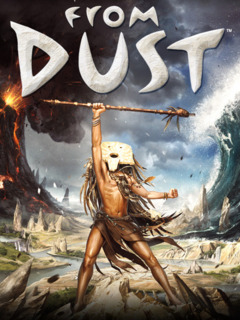From Dust delivers what it planned with style and inspiration, leaving players wanting more!
That is the big issue and also the beauty of it. Perhaps that bit of sand you placed for your villagers to cross a river will overflow the entire village and many times you catch yourself rebuilding your game because you accidentally routed the lava flow right into your village.
Every element interacts to each other in a unique way, sometimes saving lives, sometimes ending them. The engine developed for such dynamic events bases itself strongly on physics. You can see the laws of physics harmoniously dancing together. Of course, as in the real world, Nature isn't always friendly and the changes you make combined with the constant changes in the world - many times aggravated by level-specific triggers as water or lava sprouts - can and many times will ruin your game.
These aspects will keep your attention sharp at all times as catastrophe is almost a matter of time. In fact it's the general sense of insecurity and fragility that leads you to speed up your terraforming in order to get the things done. In the end it adds to the general idea of the game that everything changes, not only the terrain, or the place the tribe inhabits, but also these habitats and ultimately the very spiritual belief that is ephemeral.
Unfortunately, that fast paced landscape altering sometimes feels a bit too fast and makes you regret leaving the island you worked so hard on.
This is also something From Dust delivers with mastery. The sense of connection the player has once he interacts with the world. Very soon it becomes his world, his island and his little mask-wearing villagers. And once you see them raising decorated poles amidst a lush pasture with bushes and flowers and palm trees you can't help but rejoice as you know it has been made so with your help. The game's graphics contribute to this feeling with life-like lighting and yet and otherworldly feel, and of course depth-of-field, wonderful textures and glowing particles.
You don't necessarily have to leave. You can keep playing the same map indefinitely, but if you're playing for the first time or you don't use to save your progress very often you'll most likely tend to rush your way to the next level once you see the demise of your village by a nearing lava flow or water flow one step closer at a time.
Apart from all of this, From Dust offers challenge modes which act more or less like minigames where you have a more puzzle-like objective instead of just moving on with your villages. These can get pretty hard and give you a large sense of accomplishment especially when you move up the ranks in the game's built-in leaderboard system.
Yet somehow, unfortunately, the games feel lacky at times. You can beat the entire story mode in an afternoon and there is no way to make it harder or easier. After you've seen the ending and the credits start to roll, what happens is that you want more.
A proper sandbox mode, where you can alter the atmosphere colour, the base element (water, rock or sand) and the powers you can have as well as the number of starting villagers is something that could have been easily implemented and wasn't. Not to mention multiplayer collaborative island building. Or maybe competitive island building would sound interesting. Also more elements, plants, animals and buildings to play with and place could be an enormous gain that is not very far from being added with an update or expansion pack.
All in all, From Dust is a wonderful and innovative puzzle-strategy game that is definite worth playing. It gets old fast, granted, but it's also bound to make you relax and enjoy your private almost-desert island with godly powers to wreak havoc or seed life.

